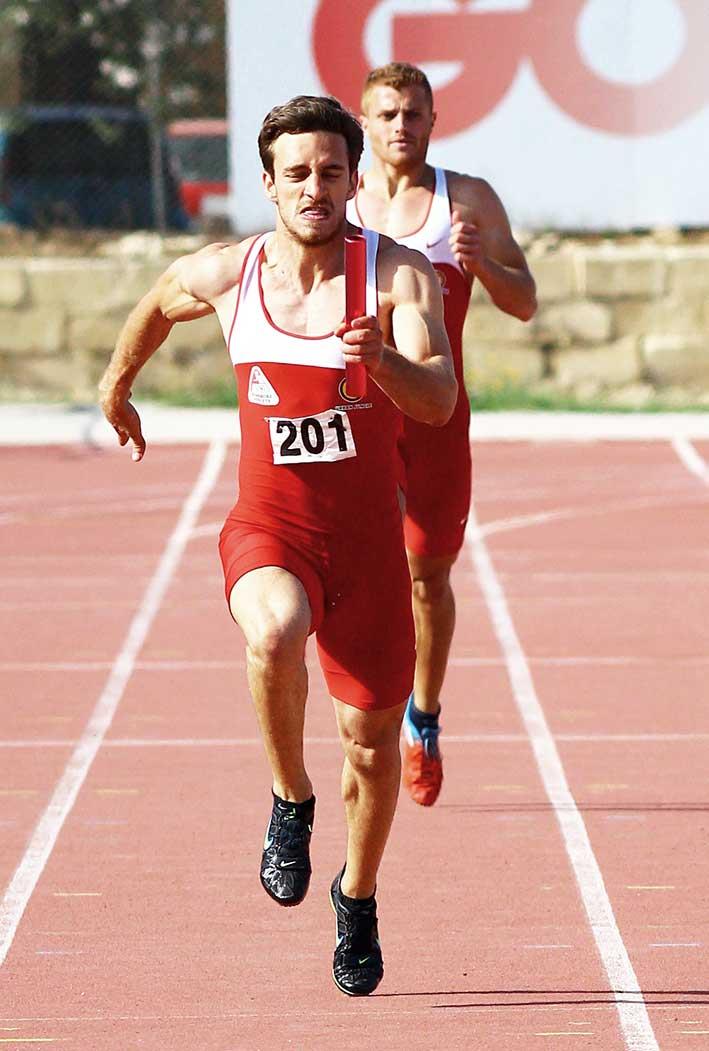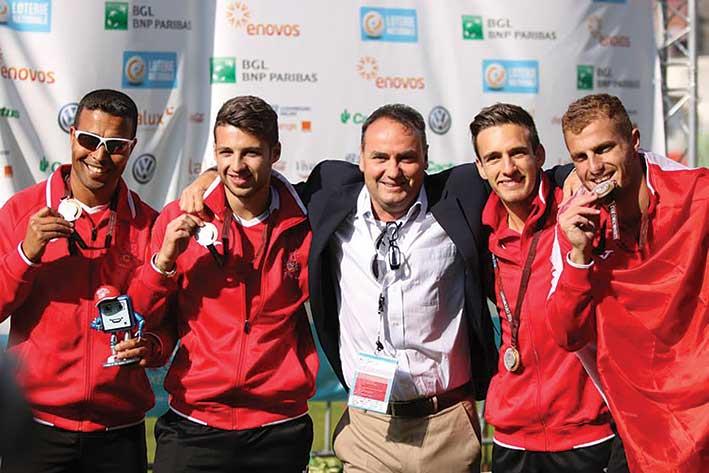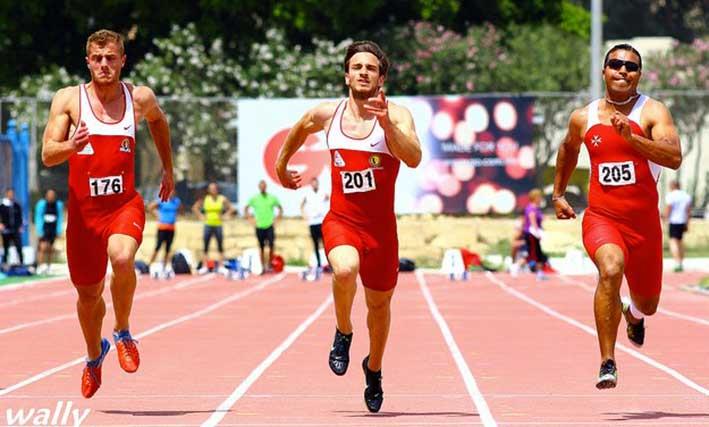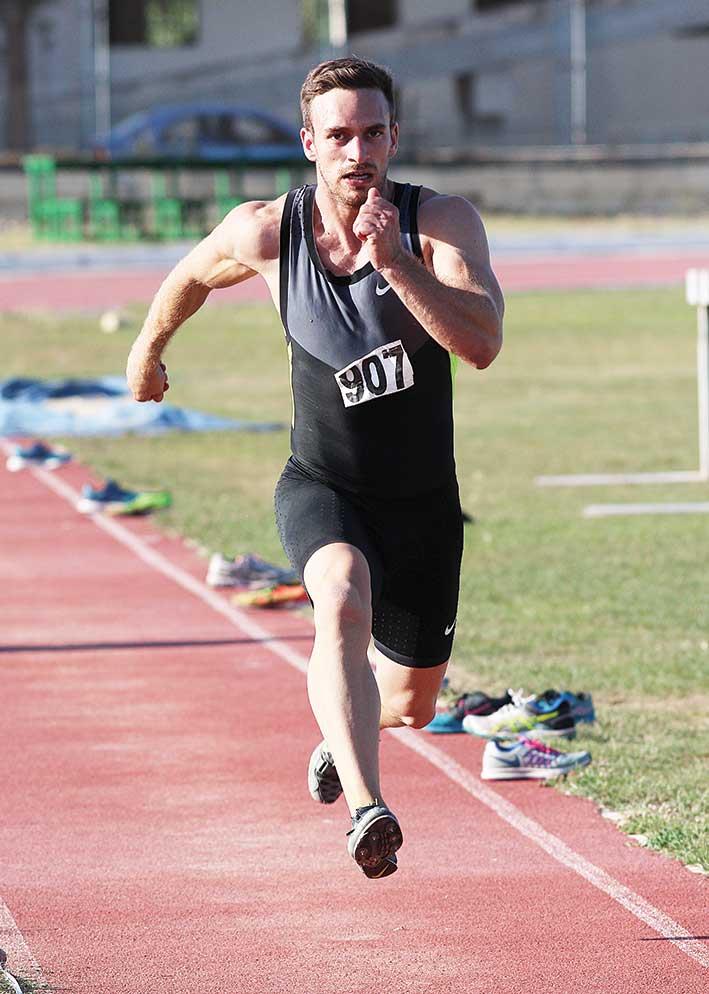The spotlight today is on 28 year old Andy Grech, a former National Elite Athlete based on the Sprinting and Jumping events. Andy, a three-time GSSE medal winner, and still the holder of a few national records has travelled far across Europe, in a constant effort to reach the highest level possible for our tiny island. Now, a physical education teacher at Stella Maris College, he is reading for a Professional Doctorate in Elite Performance Sport at the University of Central Lancashire. His doctorate is funded by the Malta Sport Scholarship Scheme.
1. Andy tell us a little about your doctorate and research. What inspired you to take on this challenge?
When I was younger and an aspiring athlete, my team mates as well as myself would encounter countless hurdles along the season, some larger than others, but mostly solvable. Anything to do with our coaches, an injury, our studies were all tackled internally, or with our support group (family, team mates, peers etc). Yet, as we grew older we began to notice, that as our difficulties became more serious, they stemmed from sources we had little to no control over. I watched as some of my closest friends would not come away with us on a high-level international competition because of a decision that was taken by 'up-above'. Undeserved to say the least, this is one of the quickest ways we lost promising local athletes. On our ventures abroad, we would meet athletes from all walks of life, sit, talk and discuss anything and everything about our sport. But in a matter of a few years, he's a professional athlete, and I'm watching him jump for Great Britain at the 2012 Olympic games. We were at the same competition... I outjumped him... what on earth am I doing wrong?! Self-doubts never helped any athlete, but the older I grew and began to understand what was going on, the more questions I began to ask myself.
Bluntly, why can't a Maltese athlete earn a living solely from sport? In contrast other countries which all fall under the one million inhabitants mark, can boast a number of professional athletes, as well as great results at Europeans, worlds and the Olympic games. Indeed, Liechtenstein, one of the smallest states in Europe, with a modest population of 38,244 as opposed to Malta's 416,338, has very recently won bronze at the 2018 Winter Olympics in PyeongChang, South Korea - their ninth at the winter edition! What kind of problems currently exist locally and what factors are disallowing the Maltese population to be as equally competitive as other European micro-states? Questions which two years after hanging my spikes, will hopefully be answered once and for all.
2. Whenever Maltese athletes represent our country and return with poor results, We immediately cast doubts on our local athletes. Blaming the size of our small country, the lack resources, proper amenities and infrastructure. The shortage of the correct professionals, athletes who are unwilling to make sacrifices and unmotivated coaches. This type of circular reasoning always ends without any form of solution. What are your views on this matter, and do you think that the results which follow are justified?
I remember an athlete (who I still look up to) was chosen to go to the Beijing Olympic games. Even to say that I once raced against him was an incredible honour for me. The instant his race was over, the people went online to post the most hurtful comments possible to any athlete. Individuals who I am sure, do not understand the incredible undertaking it is to practice any sport at the highest level. The dedication needed, the incredible amount of sacrifices, as well as the money. You need to become a wizard at prioritising and time management. Unfortunately, as a population us Maltese are so very quick to judge, point fingers and complain. The topic does not need to be sport but could be in our every-day life. To the many who believe that being a small country should affect our sport results, I would say that there are countries smaller in GDP, population and geographical size around the world making their mark internationally, and winning medals (at Olympic games, world and European Championships). To the many who believe we lack resources, amenities and infrastructure, I would say to them that most of us train in luxurious facilities when compared to Caribbean and African athletes. When it comes to the lack of knowledgeable staff, I say to them that we have plenty of motivated individuals studying desperately needed subjects and topics but are not put to work. Unfortunately, many of my answers simply lead to more questions, so before any forms of conclusions be made, an in-depth study on Malta's sporting backdrop is essential. Research on Maltese sport and its athletes has increased however, authors have preferred to focus on the betterment of the physiological and psychological individual. All the while, we have never assessed the possible differences, challenges or shortcomings within an organisational or policy setting. One of my first steps in my research would be to highlight what are believed to be the pivotal points Malta must embrace before any type of step forward is taken.

3. Andy, I know that your degree (study) does not cover just one sport discipline, but the entire elite sports community. Which includes the likes of federations, associations and different clubs. Earlier you stated that you have been an active member in elite athletics for years now and represented Malta abroad several times too. So let's put it forthright, can you pin point what our country and athletes are lacking when compared to other countries? In your opinion what needs to be done?
Anybody who follows the local elite scene will surely have his own opinion, so like them I will explain what I believe is one of the largest problems we have. To make it clearer allow us to imagine us building a house together. Firstly, before even designing the building we would properly examine the proposed area and the several important factors we must consider before building on the area chosen. Similarly, proper research and the exploration of Malta's sport scenario is needed. Next, together with an architect, contractors, builders etc. we would move on to discuss, than design a rigorous blueprint depending on the strengths and weaknesses of the area, our wants, needs, all tied down with a budget. Likewise, together with experts and stake holders in local sport we would design a similar well thought out plan, strikingly, with very similar objectives! Finally, all involved parties would spend time on the laying of the building's foundations, to make sure that the structure is strong and long lasting, keeping in mind the type of the foundations would depend on the size of the build. The builders could be envisaged as coaches or clubs, who are in charge of the overall product. What would happen if the architects and builders are not educated on the building of the property? Similarly put to Maltese officials, coaches and clubs. Iceland spent over 15 years building their handball, basketball and football teams, and look at them now! Malta, on the other hand have not. Disappointingly, we so often take short cuts, by recruiting foreign 'Maltese' to don our colours. A comparative study amongst successful countries might be the only way to achieve international sporting success. The winning athlete or team would need to rely on the 'performance' of their national system: especially since that system is responsible for coordinating the way the country's resources and tools are utilised.
4. Regrettably athletes, coaches and associations have felt the need to complain about the lack of funding. Yet, the government has committed itself to the heavy investment on athletes and their respective infrastructures. Do you think the level of local sport will improve once our athletes are provided with better amenities?
This year we were successful in our bid to host the 2023 GSSE games, which means that the investment has already begun, more so in local facilities here. Making use of new facilities and equipment will definitely help all parties involved, especially motivate and encourage the athlete and coach. However, I believe that facilities alone, do not make the athlete. Many believe that the success in Icelandic football was due to the hefty investment in facilities in the last 15 years. Having said that, Malta could easily state that we too have invested in facilities, with artificial pitches sprouting all over the island. Yet, Maltese football has never quite reached the Icelandic standard. Cyprus seemed passive in investment, only doing so when competitors (like Iceland and Luxembourg) became ambitious and began to participate in world class events. Still, the main difference between Malta, Iceland, and Cyprus was that Iceland complemented their new facilities with parallel investments in coaches, supporting sport science labs and medical teams. Regardless that no teams in Iceland were professional, the islanders set up a coaching scheme, which saw a Micro-state of no more than 335,000 develop 600 qualified coaches, 400 in fact with UEFA B licences. Furthermore, the coaches were strategically spread across a spectrum of player skill level. As Dagur Sveinn Dagbjartsson of the Icelandic FA observed: 'Here you need a UEFA B licence to coach from Under-10 level up, and half of the UEFA B licence to coach under-eights'.
Local funding is a topic which is continuously reputed and will forever be debatable. Anticipating and isolating domestic issues and priorities, the handling of local pressures as well as the effective management of limited resources (human or financial), might help academics and policy makers identify and prioritise what is needed for the development of local sport. All stakeholders involved (the government, SportMalta and the Maltese Olympic Committee) have made great strides by introducing different schemes and incentives. However, we need to see that these are constantly updated and amended. There are too many factors to consider, before concluding local sport will be taken to the next level. What we might collectively agree on, is that developing athletes worthy of Olympic medals, requires a carefully planned and long-term strategic plan.

5. At times we set unrealistic goals and are heavily let down by their outcome. A case in point is our National Football Team coach Tom Saintfiet, during his short tenure stated that the National Football team would not only improve but it would qualify for the Euros in 2024! This time round, our facilities were not an issue, as Saintfiet commended the MFA technical centre. Can you pinpoint a few reasons why over eager and optimistic foreign coaches often fail?
When policy researchers attempt to compare the differences in sport participation, nations often place themselves in traditional groupings, based on variables such as population size. For this reason we should be focusing our research on micro states. Recently, I have heard of another sport association who have agreed to pay an unbelievable amount of money to a foreign consultant who has taken on the task of improving the quality of practice in this sport. By no means do I intend on discrediting the individual, as I am sure no Maltese individual has his experience or expertise on particular matters. However, I really do hope that before he even steps foot on our local fields of play, he has carried out the necessary research on our tiny island. Aside from the immense difference in geographical size, as well as the selection of athletes, the individual hails from a country that not only houses thousands of professional athletes but can even boast researchers, technical officials and coaches of international and even historic reputation. A country which has been focused on winning medals since the very first Olympic games in 1896. Universities are able to educate tens of thousands of students, all the while carrying out valid research on sport every year. Through a tightly knit sport network, and an incredibly effective and efficient sport development system, the nation is able to continually produce the next generation of medal winning athletes. Their sport development system, and by extension their elite system, has acted as a model for many other countries. Must I continue to stress on just how much research and work be done before he even sets off? I believe that pre-set studies should be encouraged in the hope of quickly identifying local problems, grey areas and different social trends. This will allow the individual to grasp the reasons why this sport's elite development is failing to progress as expected.
Once his tenure here is complete, I do hope someone will continue in his footsteps. Has the association thought about a long-term plan? Or will these welcomed changes stop, with the end of his contract? I believe that Mr. Saintfiet stumbled along some of these hurdles along the way to greatness.
6. Professionalism is a term grossly used in Malta. Yet, as a general population we often have problems fully committing ourselves to the notion. What do you believe the main reasons are?
The first part of my study will shed light into Malta's own national traditions and history, unique strengths as well as weaknesses, that have led to success and disappointments in the past. I do believe that at times a lack of professionalism has been the reason for our disappointments. It's very easy for me to list a number of ways how athletes from other successful countries are treated, how their country and sponsors fund their training, equipment, competitions, coaches etc. Nevertheless, we must be realistic, Malta has many other pressing priorities. Still, I don't entirely believe our athletes are the only individuals who lack professionalism. At times we are let down by our associations and the governing bodies involved. Having said that, many referees, officials, coaches, board members in clubs and associations are all run by keen volunteers or reimbursed with a silly amount. Truth be told all is incredibly admirable but is one of the main reasons why at times we falter. Individuals involved simply choose to sustain themselves through other methods than sport.
As a nation, we must acknowledge that locally football exhibits eminence. Aside from being our national sport, people simply love to watch it and practice it. For the sports men who are successful in making it to the highest of leagues, football and the MFA collectively possesses the highest standard of professionalism (structure, man power and staff, funding etc.) on the Maltese islands. Some athletes and members of staff are so well paid, there is no need to have a day job, which is many local athletes' dream (as was mine). Each will be able to work with the best coaches, doctors, physiotherapists, physical trainers, etc. because they're the only association which have the strength to pay handsomely. Having said all the above, we still struggle to overcome nations which have only just been recognised by FIFA. Even though Iceland have been making their presence felt at European and World stages, they still consider themselves a micro state... with large targets. Maintaining their amateur or semi-professional beliefs. When interviewed, athletes have said that they simply enjoy the sport, they play to have fun, which at the end of the day is considered an amateur belief. Money is not an issue. I believe that professionalism is an attitude, a mind-set which should be thought and encouraged from a young age by our coaches, PE teachers and parents.

7. Overparenting has become an insurmountable hurdle to many local coaches and is leading to un-coachable athletes, who lack mettle, independence and self-confidence. Given you are faced with similar instances in your capacity as a PE teacher, what are your views on this issue?
Dr. Adele Muscat, our National Sport school sport psychologist tackled a very similar topic whereby, once identifying different challenges youth football players face when they migrate, she helped these young players adjust and prepare for their new and trying environments. Her thesis, entitled 'Preparing Maltese Footballers for Migratory Transitions: An Action Research Study', is a very interesting read. One of Muscat's most prominent finds was that over-parenting, was the main reason why youth athletes struggle with psycho-socio skills, which are so important further down in the athlete's career.
The social "mysteries" of sport will never be understood without accepting culture (Heinemann, 1999). That being said, us Maltese are better known for spoiling our children, enforcing strong traditional family beliefs and our cooking, as opposed to our sporting culture. To mention a few examples, we might look into Australia's great love for sport, or Norway's high volunteering rate, which many believe is the reason for their past success. In a similar light, well-wisher's believe Iceland's sport achievements boil down to pure mental and physical strength. However, Iceland's feats are due to their rigid sport structures, their professional mentality and their cultural and social background. Studies have highlighted how cultural and social background have in fact decreased over the past few decades. Yet, these studies were also able to explain how 45% of these countries studied were in fact successful. Having said that, we must keep in mind that no topics we've discussed together can be quickly reformed by sport policy. At a logical level, you simply cannot impose a champion mentality or a medal winning culture in a country through policy alone.
8. To my knowledge only a handful of footballers are being paid a monthly salary which can sustain a family. Others must resort to a binary path of academics and sport. Locally, interest in sport and physical recreation is improving, however options are limited in terms of bread winning. Sport Malta have introduced incentives at places of work which continually support elite athletes allowing them to dedicate more time to training whilst still enjoying full pay at work. Are these schemes and/or private sponsors a move in the right direction or you suggest something more tangible and wider?
I believe that the schemes and incentives put forward have worked wonders, in our elite sport system. Having said that in the past many athletes have still been very successful in balancing studies, work life and training. Aside from constant support being well needed, we must care for our athletes and their coaches, yet what I believe should be our largest priority is that all interested parties work towards a common goal. One of the biggest advantages we have over larger populations is that we work within a small community. Whilst creating a diverse set of opportunities, research has shown that Iceland's small community, and by extension their tightly knit network has been one of the fundamental reasons behind Iceland's success over the years. These networks have been incredibly efficient in passing on information to the next group of individuals taking on the task, especially if athletes, coaches or administrators travel abroad to join an international team. In Iceland (similar to all European micro-states) mainly due to the lack of inhabitants, there seems to be an overlapping of roles, so that individuals are tied to each other in many ways, this allows information to be passed on quickly and effectively between the people and groups. The road to professionalisation in Iceland was due to this so called "inter-locking" between all groups. Unfortunately, in Malta we have not been able to take advantage of this circumstance, for reasons which I hope will be uncovered in my research. To the many individuals who are interested in local elite sport, culture and society we must remember that sport does not exist in a neutral social, economic, cultural or political context, but is in fact influenced by all the above.
9. Andy, it is quite easy to pinpoint problems in the system, but we also need solutions. How do you intend on carrying out your research and how do you intend on using your results to better the situation here?
The question of 'why' countries behave and make decisions continues to derive from a diverse set of national cultural values and traditions, political and administrative structures, and relationships between governmental and civil society sport organisations (Bergsgard, Houlihan, Mangset, Nødland, & Rommedetvedt, 2007). My first step will be to investigate what problems currently exist locally and what factors are disallowing the Maltese population to be as equally competitive as other European micro-states. My second would be an in-depth study into the sport systems of our micro-state competition. De Bosscher & De Knop's (2003) model of determining success, is believed to be the best guide to carry out such a broad comparative study. When investigating both local and foreign scenarios I will keep in mind three main target areas. At the micro-level, one will find the involvement of athletes and their respective coaches, coupled with their personal/ genetic qualities, the micro-level is believed to be easier to investigate and compare. The meso-level will mostly be built upon sport policies and governance, factors at this level are the only of the three to be easily altered or changed. We must not forget that athletes have a better chance of success given through effective policy and wise-investment decisions. Consequently, it comes as a surprise why only a small number of studies have been carried out on similar structural factors, and to what end national organisations spend such large amounts of their funds on policies which cannot be empirically tested. Still, at times we forget that you simply cannot impose a champion mentality or a medal winning culture in a country through money alone. Which is why our final factor will tackle medal expectations and sporting success of grounded on macro-level factors, which tackling socio-cultural issues. Many researchers used an economic approach as a point of reference, yet, since micro-states like Malta might have other pressing priorities. Which is why a sociological based explanation will be needed.
Based on the data collected, I will then move on to compile and adapt an applicable high-performance sport development system model, specifically for local Maltese sport, ready for immediate deployment.
